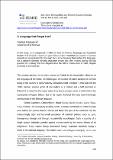Files in this item
A language that forgot itself
Item metadata
| dc.contributor.author | Kamusella, Tomasz Dominik | |
| dc.date.accessioned | 2014-10-29T15:31:05Z | |
| dc.date.available | 2014-10-29T15:31:05Z | |
| dc.date.issued | 2014 | |
| dc.identifier.citation | Kamusella , T D 2014 , ' A language that forgot itself ' , Journal on Ethnopolitics and Minority Issues in Europe , vol. 13 , no. 4 , pp. 129-138 . | en |
| dc.identifier.issn | 1617-5247 | |
| dc.identifier.other | PURE: 156349152 | |
| dc.identifier.other | PURE UUID: a92e987a-cf11-4519-915a-cc3f7190f193 | |
| dc.identifier.other | ORCID: /0000-0003-3484-8352/work/42102763 | |
| dc.identifier.uri | https://hdl.handle.net/10023/5579 | |
| dc.description.abstract | In this essay, as a background, I reflect on how the German language was liquidated in post-1945 Poland’s region of Upper Silesia where nowadays the country’s German minority is concentrated. But the main focus is on the irony that neither this language, nor a genuine German minority education system has been revived during the last quarter of a century that has elapsed since the fall of communism in 1989, despite promises to the contrary. | |
| dc.format.extent | 10 | |
| dc.language.iso | eng | |
| dc.relation.ispartof | Journal on Ethnopolitics and Minority Issues in Europe | en |
| dc.rights | © 2014. ECMI | en |
| dc.subject | Poland | en |
| dc.subject | German minority | en |
| dc.subject | German language | en |
| dc.subject | Polonization | en |
| dc.subject | Upper Silesia | en |
| dc.subject | De-Germanization | en |
| dc.subject | D History General and Old World | en |
| dc.subject | PB Modern European Languages | en |
| dc.subject.lcc | D | en |
| dc.subject.lcc | PB | en |
| dc.title | A language that forgot itself | en |
| dc.type | Journal article | en |
| dc.description.version | Publisher PDF | en |
| dc.contributor.institution | University of St Andrews. School of History | en |
| dc.description.status | Peer reviewed | en |
| dc.identifier.url | http://www.ecmi.de/fileadmin/downloads/publications/JEMIE/2014/Kamusella.pdf | en |
This item appears in the following Collection(s)
Items in the St Andrews Research Repository are protected by copyright, with all rights reserved, unless otherwise indicated.

